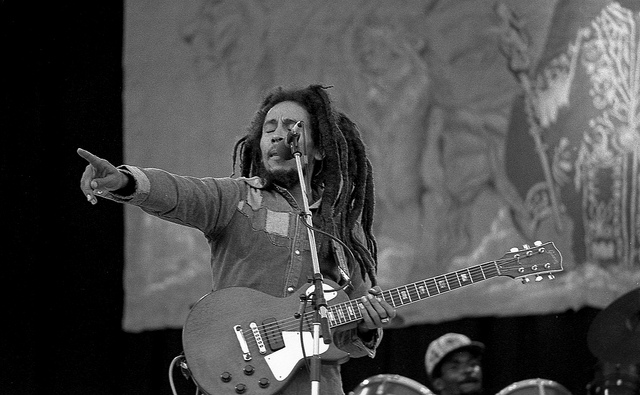Image by monsoons via Flickr
Lauren Shade | Staff Writer
opinion@fiusm.com
Guest speakers Douglas Smith – a Rasta priest – and I. Jabulani Tafari, founder and editor of magazines Rootz Reggae and Kulcha joined political science professor Mirsad Krijestorac at his ethnicity and nationalism class Tuesday, March 17.
The goal was to decipher the meaning of Bob Marley and The Wailers’ song “I Shot The Sheriff.”
You may be familiar with the song – its infamous lyrics have been readapted and replayed time and time again. In the song Marley admits to murdering a sheriff out of self-defense, but he denies shooting the deputy, a charge he is also being prosecuted for.
“If I am guilty, I will pay. But if they lock up a black man, a poor man, people of color in America, in anywhere in world, sometimes they pin other charges on you,” Tafari said.
The song references injustice in a legal system that works in favor of the privileged.
Listening to the explanation of this song and its ties with Rastafarian culture, I was reminded of the past tragedies involving minorities that gained global attention in America: the Trayvon Martin trial, the Ferguson shooting, the death Eric Garner and more recently Martese Johnson’s beating outside of a pub in Charlottesville, Va. It’s surprising that a song written in 1973 can relate to what is happening today, but injustice existed then as it does now.
Whether these examples are completely separate events that do not show a correspondence between injustices towards minorities and bias in the the American legal system, one thing’s for sure – the media has created stereotypes of minorities by over-representing them as the aggressor in crimes.
The media doesn’t work on truth though, it cherry-picks and distributes what it wants to accommodate for whatever sells best to their target audience, thereby dulling the seriousness of the crimes themselves.
Bias that exists in our legal system can no longer be separated from the propaganda that surrounds a crimes involving minority groups. People end up asking themselves whether it is institutional racism or is coincidence that lands mostly minorities in jail.
Some people will always say a white person killing a minority is a racist act. Not only is this not true, but it is stealing our attention from the actual crimes involving race.
“Blacks and whites often view each others’ reactions [of violent acts against either race] as being motivated by a reflexive form of in-group favoritism and out-group prejudice,” Mark Peffley said in the book “Justice in America: The Separate Realities of Blacks and White.”
The hashtag culture that has ignited today’s youth doesn’t bring the right attention to these palpable issues, either. Rather, it brings a hoard of counter-protests such as #blacklivesmatter versus #alllivesmatter or #whiteprivilege and #blackprivilege that are all so shrouded in controversy that no one seems to be able to come up with a real solution outside of a tweet or hashtag war.
The problem is that legal discrimination against minorities are starting not to go unnoticed, but to be swept under the rug and shrugged off as insignificant coincidences. Injustice toward minorities in our predominantly white legal system exists, but when I try to bring to light this problem today people think I have the mentality that every white person is racist.
A study published in “Youth Violence and Juvenile Justice” by Tia Stevens and Merry Morash stated that whether they self-reported low, medium or high involvement in delinquency, black and Hispanic boys were more likely to be sent to a correctional institution than their white counterparts.
A Washington Post article by John Sides stated that about 60 percent of whites believed that minorities deserved to be imprisoned more because they were more prone to commit crimes. According to the Sentencing Project polls, at least 60 percent of people in prisons are minorities. Specifically for black men, 1 in every 10 are in prison or jail at any given time.
“The only way to end separate racial realities is either to educate whites about the experiences of blacks or, even better, to reduce blacks’ negative experiences with unfair treatment in the justice system,” Sides said.
Whites and nonwhites have been pitted against one another by the media when the problem isn’t our differences, but the system itself. That is what Bob Marley’s song is ultimately about – forcing us to see these injustices for what they really are.


Be the first to comment on "Music is more realistic than the media when it come to race"